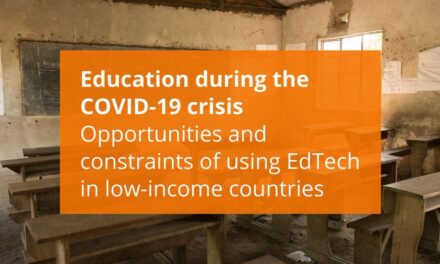More and more, across the world, education is being geared to employment. The workplace is rapidly colonising the classroom. Enjoyment is being outlawed in favour of relevance. In this UKFIET Blog, Mike Douse explains how, in the Digital Age, this is the very opposite of what should be happening.
“At least they weren’t teaching to the test”, was one Education Minister’s response to the news that her country’s PISA ranking had fallen from 122nd to 155th. Conversely, there was much joy amongst UK ministers as England’s primary pupils moved to fourth in the world league tables for reading (behind Singapore, Hong Kong and Russia), neglecting to acknowledge that “just 29 per cent of English children agreed with the statement they ‘very much like’ reading, compared to 42 per cent internationally” (PIRLS, 2023).
As a fundamental right of the child, learning should be fun. Because life itself is meant to be pleasant, and as formal education occupies a significant proportion of people’s lives, then the years spent as a student should surely be congenial. And it should be fun, not because a happy lesson is an effective lesson, although that does tend to be true, but, because life itself should be as pleasant as possible for all concerned, education should be enjoyable as an end in itself. Indeed, as the end in itself.
Engendering a love of learning, and underwriting enthusiasms, and generally having fun in understanding and responding to our world is self-evidently excellent in a moral sense but is diminished when perceived as a mere economic good. Bringing the marketplace into education and the workplace into the schoolroom devalues the invaluable, transforming a wonderful universal right into a mundane tradable commodity.
Formal education occupies a significant proportion of people’s lives, in terms of time and, even more so, in terms of consciousness. It is, therefore, imperative that it be as pleasurable as possible – characterised by laughter rather than misery. Attempting indirectly to create individual and communal wellbeing – through economic growth – brought about by increased productivity – by means of a better educated workforce – is a remarkably roundabout route to human happiness.
The worldwide response to contemporary invention, including Artificial Intelligence, is to place a premium on the sciences, technology, engineering and mathematics – those very STEM subjects at which computers excel. Where humans are ahead of the machines, at least for now, is in the creative subjects such as the arts, broadly defined. But, increasingly, the mistaken emphasis worldwide is to minimise poetry, music, debating, painting and suchlike in favour of mechanical courses with rigid syllabi.
A recent presentation of broader, deeper kinds of learning that encourage young minds to push beyond the confines created by the algorithms of social media concludes that the current curriculum allows no time for such investigation: “All these interesting avenues to explore and we have to stick to the main road, our eyes fixed straight ahead… nothing is more valuable than teaching a subject that requires young readers to enter imaginatively into the lives of others”. Nor more enjoyable.
Similarly, the temptation to sugar coat the pill of compulsion with the saccharine of relevance should be resisted. We do our students a serious disservice if we treat them predominantly as future adults. It is what they ‘are’ rather than what they may ‘become’ that is significant. Stimulate them, stretch them, encourage them, inspire them, promote their potential, advance their individuality, cultivate their community spirit, foster their natural curiosity, underwrite their divergent enthusiasms – in other words, educate them. But do so with their present pleasure rather than their future vocational fulfilment as the primary objective – let there be laughter as their inalienable right.
There have been almost 5,000 answers online to the question “Should a teacher focus on ‘rigorous learning’ or ‘learning with entertainment’?”, posed a decade ago on an academic website. An emerging consensus is that “rigorous learning and learning with entertainment should be seen as complementary to one another”, although there is widespread concern that “too much time devoted to entertainment limits that available for analyses and conceptualisation”. Moreover, virtually all responses accepted ‘learning’ as the inevitable objective, rather than recognising ‘entertainment’ as the ultimate goal in its own right.
Much of that which is taught in schools is of, at most, marginal relevance to the likely livelihoods of the students involved. Which is just as it should be. Based upon millennia of human experience, the work that most adults are likely to be doing a decade or so hence – unless we can truly harness AI in the service of humanity – will, as now and as ever has been, be despicable and dehumanising drudgery. If a youngster’s destiny is to break dusty bricks or carry impure water for a hundred thousand or so adult hours, all the more reason to ensure that the time spent in school should be extensive, exhilarating and entertaining (and entirely un-work-related).
For, if education is defined in pecuniary terms and aimed at economic goals, it will inevitably be regarded as a function of the market and, consequently, the world of work will come to colonise the space of the school. This is already occurring and must be resisted. Only when it is recognised that education is about self-realisation and intangible pleasure (as opposed to acquiring marketable skills and the getting of certificates), will the profiteers be chased from the temples of learning and the laughter of children come to drown out the clacking of the cash registers.





